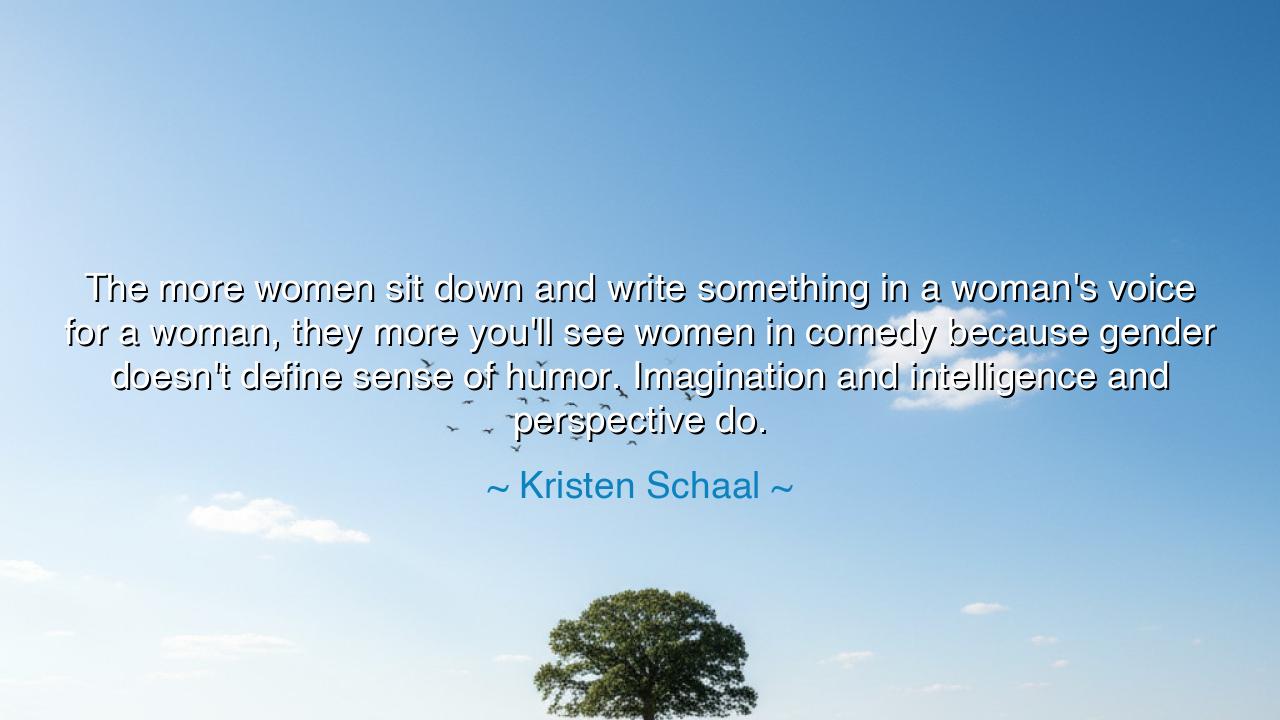
The more women sit down and write something in a woman's voice
The more women sit down and write something in a woman's voice for a woman, they more you'll see women in comedy because gender doesn't define sense of humor. Imagination and intelligence and perspective do.






Hear the words of Kristen Schaal, a voice of wit and wisdom in the modern age: “The more women sit down and write something in a woman’s voice for a woman, the more you’ll see women in comedy because gender doesn’t define sense of humor. Imagination and intelligence and perspective do.” In this declaration lies both rebellion and revelation — a call not only for inclusion, but for liberation. Schaal speaks as one who has walked through a world that for too long believed laughter belonged to men, that humor had a gender, that the voice of women could only echo, never originate. Yet through her words, she declares a truth as old as creation itself: that laughter springs not from gender, but from the imagination, the intellect, and the soul.
The origin of this quote arises from Schaal’s own journey as a comedian, writer, and performer in an industry where women’s voices were often muted or dismissed. Coming up through the early years of stand-up and television comedy, she saw how the stage was shaped by male perspectives — not through malice always, but through tradition. The stories were written by men, for men, in a world where the woman was often the punchline, not the poet. Yet Schaal, with her unique blend of absurdity and brilliance, proved that humor is not born of gender, but of perspective — the ability to see the world as both tragedy and farce, and to hold both truths in a single breath of laughter.
Her insight reminds us of the ancient storytellers, those whose voices once filled the firesides of tribes and the amphitheaters of empires. Among them, too, women often stood in the shadows, their tales unspoken, their songs unsung. Yet wherever a woman’s story was told — whether through the mythic wisdom of Sappho, the sharp wit of Hypatia, or the cunning laughter of the goddesses themselves — a new world opened. The ancients understood that the balance of creation depends upon the union of opposites: the masculine and the feminine, the rational and the intuitive, the loud and the subtle. In this way, Schaal’s words are not merely about comedy — they are about restoring this sacred balance in the world of storytelling.
For comedy itself is a divine art, the alchemy of pain into joy. To laugh is to rise above suffering, to reclaim power over what once oppressed. When Schaal says that “the more women write in a woman’s voice, the more you’ll see women in comedy,” she is calling women to become the authors of their own laughter — to wield humor not as a shield, but as a sword of revelation. It is through writing, creating, and performing that women reclaim the right to define their own image, their own truth, and their own absurdity. For only when the woman speaks for herself does she cease to be a character and become a creator.
Consider the story of Lucille Ball, one of the great pioneers of television comedy. In the 1950s, when few women were allowed behind the camera, she not only starred in I Love Lucy but co-created and produced it, shaping the very fabric of modern sitcoms. She faced resistance from studios and sponsors, yet through persistence and genius, she redefined comedy forever. Like Schaal, she proved that humor flows not from conformity, but from imagination and intelligence — that the laughter which endures is the laughter born of truth. Lucille Ball opened the door; women like Kristen Schaal walk through it still, building upon the courage of those who dared to be funny in a world that told them not to be.
Schaal’s wisdom also reaches beyond gender — it speaks to every artist, every thinker, every soul yearning to express themselves authentically. She reminds us that perspective is the lifeblood of creativity. To find one’s voice, one must first trust that it matters. The stage of life is vast, but it is incomplete until every story is told, until every tone — deep or delicate, fierce or funny — is heard. The independence of voice is not rebellion against others, but the fulfillment of the self. For when many perspectives unite, laughter becomes richer, stories more honest, and humanity itself more whole.
O listener, take this teaching into your heart: write, speak, and create in your own voice. Do not measure your worth by comparison or convention. Whether you are man or woman, young or old, your imagination is the source of your power, your intelligence the tool of your craft, your perspective the mirror of your soul. If the world does not yet understand your humor, teach it to. If it does not yet make space for your story, carve that space with courage. For in every new voice that rises, the world itself grows wiser — and its laughter, deeper.
Thus, let Kristen Schaal’s words echo as a hymn to the freedom of creation: “Gender doesn’t define sense of humor. Imagination and intelligence and perspective do.” Laughter, in its truest form, belongs to no gender and no gatekeeper. It is the music of understanding, the bond of shared imperfection, the proof that all hearts — when brave enough to be honest — can find joy together. Let us then honor those who speak with authenticity, for through their humor, they remind us that to be human is to laugh, to dream, and to tell one’s story in one’s own voice.






AAdministratorAdministrator
Welcome, honored guests. Please leave a comment, we will respond soon